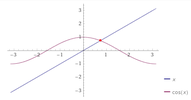Barry Hardhouse
New Member
Hi All,
Old member under a new alias - for some reason my old account lost the ability to post anything. Besides, it was high time I anonymised my stupid questions. Speaking of same...
If I have an equation of the form x = cos(x), how would I solve it?
Wolfram show us that it has one solution - see image - but not how to find it.
More generally, the equation I'm interested in looks more like
y = ax + cos(x)
which might have several solutions, or none. But I'd be happy starting with the simpler case for now.
A similar problem is discussed here
but I can't seem to extract what I need from it.
Any help much appreciated!
Old member under a new alias - for some reason my old account lost the ability to post anything. Besides, it was high time I anonymised my stupid questions. Speaking of same...
If I have an equation of the form x = cos(x), how would I solve it?
Wolfram show us that it has one solution - see image - but not how to find it.
More generally, the equation I'm interested in looks more like
y = ax + cos(x)
which might have several solutions, or none. But I'd be happy starting with the simpler case for now.
A similar problem is discussed here
but I can't seem to extract what I need from it.
Any help much appreciated!


